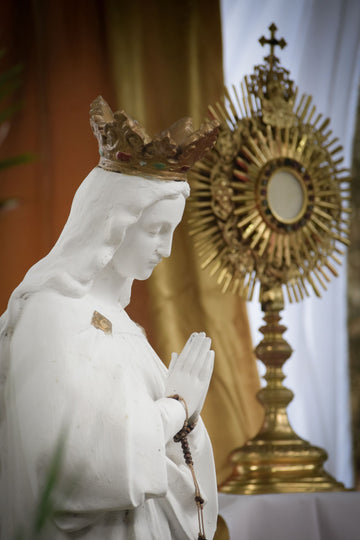"Come to Me with your questions, Your perplexities, and your needs. Nothing is too small for Me, and nothing too great. I am here for you. I wait for you to share with Me all that preoccupies you, and all the questions that arise in your heart. Worrying and daydreaming are useless. What I ask of you is dialogue with Me in the Sacrament of My love, boundless confidence in My loving friendship."
What is Adoration?
Adoration in the Catholic religion refers to the act of worshiping and showing profound reverence for the Blessed Sacrament, which is the consecrated Eucharist. The Eucharist is a central element of the Catholic faith, believed to be the actual body and blood of Jesus Christ, transformed from bread and wine during the celebration of the Mass. Adoration typically takes place in the context of Eucharistic adoration, which is a form of prayer and worship focused on the consecrated Host that is displayed in a special vessel called a monstrance.
Why should I go to Eucharistic Adoration?
-
Deepening of Faith: Adoration provides an opportunity for Catholics to deepen their faith and personal relationship with Jesus. By spending time in the presence of the Eucharist, they believe they are in the presence of Christ himself, and this can strengthen their belief in His real presence in the Eucharist.
-
Prayer and Meditation: Adoration is a time for prayer and reflection. It offers a peaceful and contemplative environment for Catholics to pray, meditate, and seek spiritual guidance. Many find it conducive to deepening their prayer life and drawing closer to God.
-
Spiritual Renewal: Adoration can bring about a sense of spiritual renewal and refreshment. It allows individuals to set aside the distractions and concerns of daily life and focus on their spiritual well-being.
-
Reparation: Some Catholics attend adoration as an act of reparation, believing that they are making amends for sins and offenses committed against God. Adoration can be seen as a way to seek forgiveness and express contrition.
-
Intercession: During adoration, Catholics may also intercede on behalf of others, praying for their needs and concerns. It is an opportunity to ask for God's blessings, guidance, and help for themselves and others.
-
Community and Communion: Adoration is often held in a communal setting, and it can foster a sense of community and shared faith among participants. Many parishes organize regular adoration hours, and this can bring together members of the church for a common purpose.
-
Silence and Contemplation: Adoration encourages silence and stillness, allowing individuals to escape the noise and busyness of the world. This peaceful environment can be conducive to personal reflection and contemplation.
It's important to note that while Eucharistic Adoration is a cherished practice in the Catholic tradition, it is not mandatory for all Catholics, and the level of devotion and participation varies from person to person. Some may find great spiritual benefit in it, while others may connect with God through different forms of prayer and worship. Adoration is essentially a way for Catholics to express their love, devotion, and faith in the real presence of Christ in the Eucharist.





